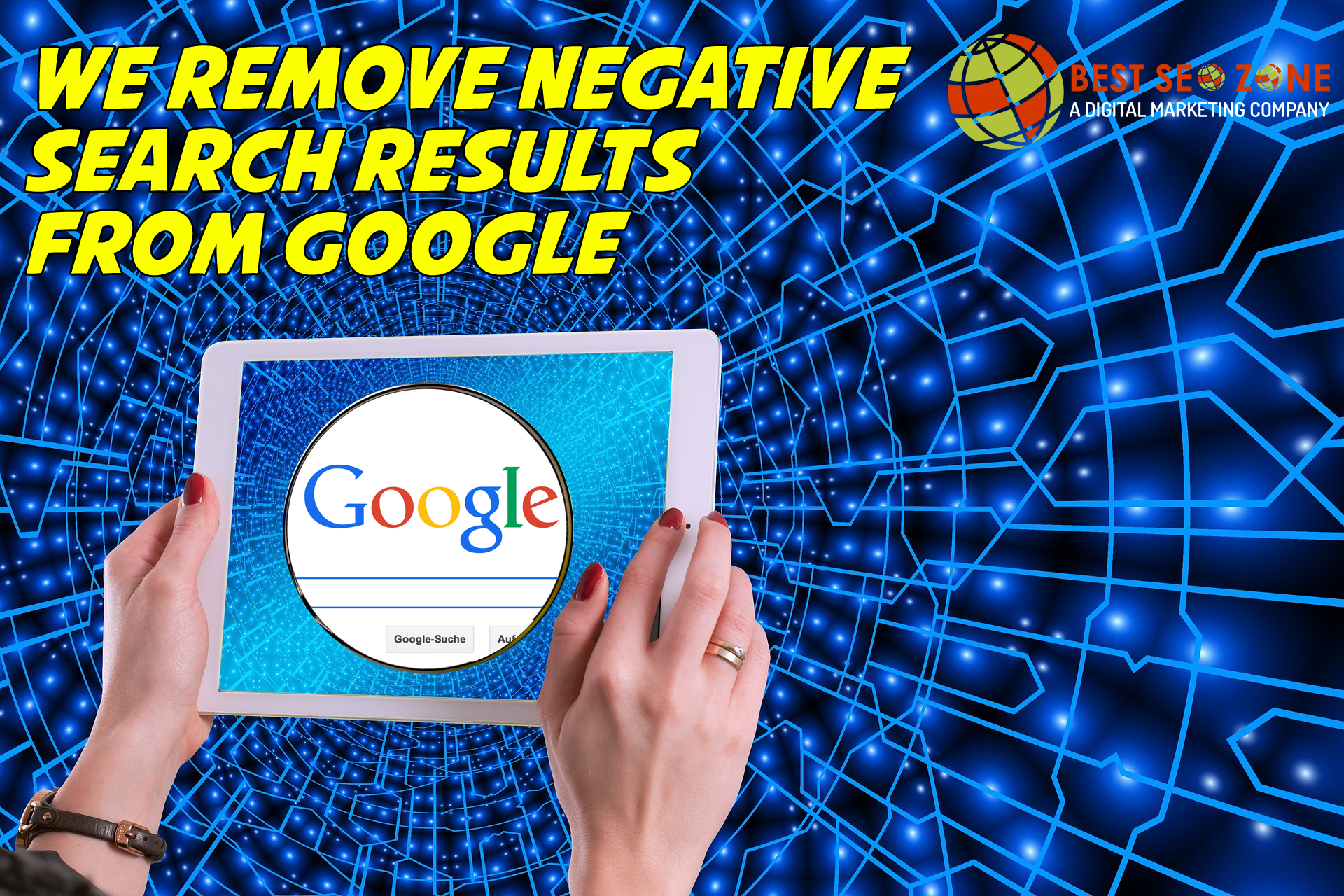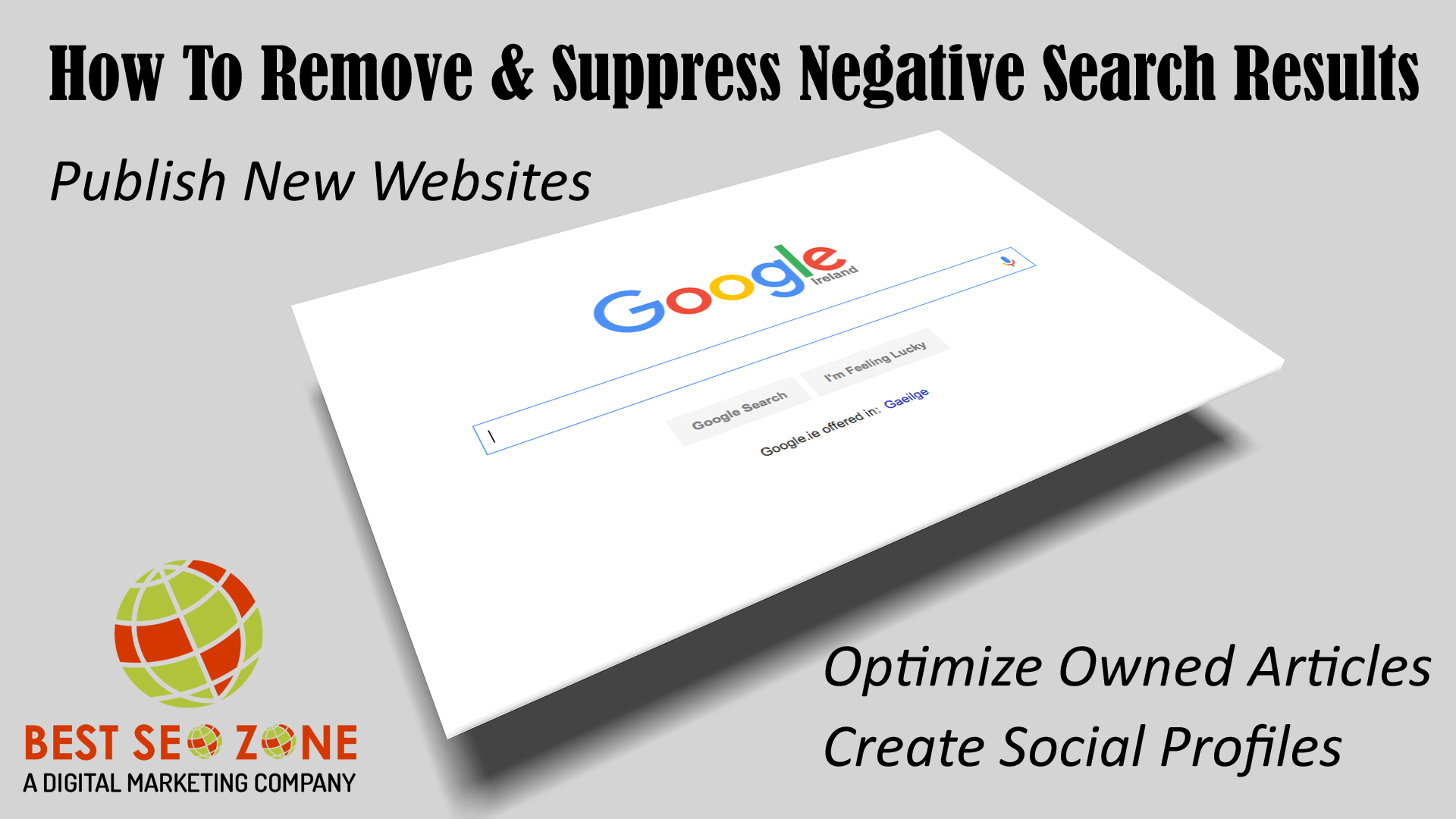Removing negative links and images from Google search results can be a challenging process, but it is possible with consistent effort and the right strategies. But our company have done many projects about this topic and have removed our many clients negative links and images from Google.
To begin, you need to identify the specific links or images you want to remove. Perform a thorough search using relevant keywords and make a note of the URLs or image names associated with the negative content.
Remember that removing content from Google’s search results is not always possible or guaranteed. It depends on various factors, including the nature of the content, legal considerations, and the willingness of website owners to comply. It’s essential to approach the process with patience, persistence, and a focus on improving your online reputation through positive actions. Here are some steps you can take:

10 Actionable Ways to Remove Negative Search Results
Remember that removing negative search results entirely may not always be possible, but by implementing these strategies, you can minimize their impact and cultivate a positive online presence.
1- How to Improve or Restore Your Online Reputation
Managing and improving your online reputation can be a complex task, especially when dealing with negative search results on Google. While it’s important to note that complete removal of negative content from search results is often challenging.
Create and optimize positive content on various platforms, such as social media profiles, personal websites, and blogs. This will help push down negative search results.
2- Create Some Positive Content and Do Proper Search engine optimization (SEO)
Optimize the positive content you create to ensure it ranks higher in search engine results. This involves using relevant keywords, creating high-quality backlinks, and optimizing meta tags.
Search engines prioritize content that satisfies user intent. Make sure your content is well-written, engaging, and informative, which encourages users to spend more time on your page. SEO (Search Engine Optimization) is very helpful in ranking positive content higher in Google search results. By implementing effective SEO strategies, you can improve the visibility and prominence of your positive content, making it more likely to appear at the top of search engine rankings.
3- Monitor Your Online Reputation
Monitoring your online reputation is a critical step in maintaining a positive digital presence. By regularly monitoring search engine results and online platforms, you can promptly identify any negative content that may be impacting your reputation. Negative search results can include unfavorable reviews, damaging articles, or harmful social media mentions. Once you become aware of such content, you can take appropriate actions to address the issue. This may involve reaching out to the website or individual responsible for the negative content, requesting its removal or correction.
Set up Google Alerts or use online reputation management tools to stay informed about any new negative content that appears. Promptly addressing such content is very crucial to minimize its impact.
4- Respond and engage In a professional and Calm Manner
If you come across negative content, respond to it in a professional and calm manner. Offer solutions, correct misinformation, or address concerns. This demonstrates your willingness to engage and resolve issues.
Address the issue directly, providing your side of the story or clarifying any misunderstandings. Remain composed and factual, avoiding personal attacks or engaging in arguments. Remember, your response is not just for the individual who posted the negative content but also for the wider audience that may come across it. By maintaining professionalism, you demonstrate your integrity and willingness to address concerns, which can help mitigate the impact of negative search results and present a positive image to others.

5- Contact Website Administrators To Remove Negative Content From Google
If you come across negative content that you believe violates website policies or infringes upon your rights, it is worth contacting the website administrators to address the issue. Start by locating the website’s contact information or a designated “Contact Us” page.
Craft a polite and professional message explaining the situation and providing evidence or reasons for why the content should be removed or corrected. Be specific about the URLs or search results where the negative content appears. Request their assistance in resolving the matter and emphasize the potential consequences of the content’s impact on your reputation or brand. While there’s no guarantee that they will comply, reaching out to website administrators demonstrates your proactive approach to resolving the issue. Be polite and provide a clear explanation of why the content is harmful or inaccurate.
6- Utilize legal options and Try To Remove Bad Content From Website
When faced with bad content on a website that is damaging to your reputation or infringes upon your rights, exploring legal options may be necessary. Consult with an attorney who specializes in internet law or defamation to understand the legal remedies available to you. They can guide you through the process of sending a legal notice or cease and desist letter to the website owner or hosting provider, outlining the reasons for requesting the removal of the content. In severe cases of defamation or copyright infringement, legal action such as filing a lawsuit may be necessary to protect your interests. It’s important to note that pursuing legal options can be a complex and time-consuming process, and the outcome may vary depending on the jurisdiction and specific circumstances. Therefore, it’s essential to weigh the potential benefits and costs associated with legal action before proceeding.
7- Secure Your Personal Data That Could Be Used Against You
Protecting your personal data and removing bad content from Google are crucial for maintaining your privacy and safeguarding your online reputation. Start by conducting a comprehensive audit of your online presence to identify any personal information that may be publicly accessible. Take steps to secure this data by updating privacy settings on social media platforms, removing unnecessary personal details from online profiles, and being cautious about sharing sensitive information online.
To remove bad content from Google, you can reach out directly to the website hosting the content and request its removal. Additionally, you can submit a request for content removal through Google’s Content Removal Tool, adhering to their guidelines and providing appropriate evidence of the harmful nature of the content. It’s important to note that removing content from Google search results can be a complex and time-consuming process, and success is not guaranteed. However, taking proactive measures to secure personal data and pursue content removal can significantly mitigate the impact of bad content on your online reputation and protect your privacy.
8- Share Positive content Across Different Mediums (Articles, Videos, Podcasts, and images)
Create and publish valuable, informative, and engaging content across various platforms, such as personal or professional websites, blogs, social media channels, and industry-specific platforms. Focus on showcasing your expertise, highlighting positive experiences, and providing helpful insights or solutions to the target audience. Utilize different content formats, including articles, videos, infographics, podcasts, or case studies, to diversify your content and cater to different user preferences.
By consistently producing high-quality positive content, you can increase your online visibility, engage with your audience, and promote a more accurate and favorable representation of yourself or your brand. Over time, as the positive content gains traction, it can push the bad content further down in search results and reduce its impact on your online reputation. Remember to optimize the positive content for search engines by incorporating relevant keywords and promoting it through social media and other channels to increase its reach and impact.
9- Leverage social media profiles That Will Shows Your Positive Impact
Establish and maintain active profiles on major social media platforms such as LinkedIn, Twitter, Facebook, and Instagram. By building a strong social media presence, you can influence search results and promote positive content.
Firstly, maintain an active presence on social media platforms that align with your personal or brand image. Regularly share positive updates, engaging content, and valuable insights that highlight your expertise and showcase your positive attributes. Actively engage with your audience, respond to comments and inquiries, and foster a positive and professional online community. Additionally, address any negative content directly and professionally.
Create a strong digital footprint that helps push down negative content in search results and presents a more accurate and positive portrayal of yourself or your brand.
10- Regularly monitor your online presence
Regularly monitoring your online presence is crucial for staying aware of any new content or mentions that could potentially impact your reputation.Once you become aware of these negative search results, you can take appropriate actions to mitigate their impact. This may involve contacting website administrators or content creators to request removal or correction. It’s also essential to document evidence of the harmful nature of the content, such as screenshots or URLs, to support your case when reaching out to relevant parties.
Additionally, you can explore options for online reputation management services or seek legal advice if necessary. Remember that removing bad search results can be a challenging process, and success is not guaranteed. However, by actively monitoring and taking proactive measures, you can increase your chances of addressing and potentially removing harmful content from search engine results, protecting your online reputation.
Our Company “BEST SEO ZONE” have done many projects about this topic, basically its not an easy task but we have experienced team and they used some useful tricks to remove bad content or image in the google search results. If you are reading my this article and wanting to remove any bad content (Link, Image, Video) that is effecting to your reputation then you are in the right place, Contact Us to make positive position of your personal or business reputation.

Dilshad Mushtaq is the founder and CEO of Best SEO Zone which is a prominent digital marketing agency based in Pakistan Since 2010. He is a professional website developer & Digital Marketer who can create any website and rank it on Google Page One.




